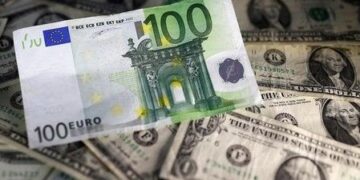MARKET WRAPS
Watch For:
U.K. retail sales, France monthly business survey; trading updates for Safran, SKF, Signify, Holcim, IMCD, WPP, Impala Platinum, Lagardere.
Opening Call:
European stock futures were higher after Asia stocks broadly rose. The dollar strengthened and U.S. Treasurys held steady. Gold and oil edged higher.
Equities:
European equity futures rose as optimism for a trade deal supported sentiment. President Trump told reporters in the Oval Office that U.S. officials met with Chinese counterparts, while Beijing played down hopes for an imminent rapprochement, saying it hasn’t held negotiations with the U.S.
“Bear market rallies are short, sharp and ferocious,” said Steve Sosnick, chief strategist at Interactive Brokers. “People are psyched about this move to the upside, but it’s still very volatile. That reflects uncertainty, though for now the mood has flipped from fearful to optimistic.”
Forex:
This year, the U.S. dollar index has tumbled 9% below its January peak and skidded to a three-year low. Goldman Sachs chief economist Jan Hatzius noted that the value of the dollar, when adjusted for inflation, still stands nearly two standard deviations above its average since the start of the floating exchange rate era in 1973.
The only two historical periods with similar valuation levels were the mid-1980s and the early 2000s, he said – both of which set the stage for depreciation of 25% to 30%.
“If non-U.S. investors don’t want to buy more U.S. assets at their current prices, those prices must fall, the dollar must weaken, or (most likely) both,” he said. With the U.S. economy not expected to outperform its rivals, investors will have reason to curb their appetite for U.S. assets, he said.
Bonds:
The yield on the U.S. 10-year held steady after falling another six basis points to 4.32% overnight settling. It logged its largest weekly move since 1987 about two weeks ago.
“Markets rise and fall based on what the Fed might do,” said Jamie Cox, managing partner for Harris Financial Group. “Putting that to rest is a big deal.”
Looking ahead, if Trump can ink a few trade deals over the next few months and avoid further Fed attacks that had “a lot of people running for the hills,” Cox said he expects stocks to regain record territory.
Energy:
Oil futures recovered some of the previous day’s losses brought on by oversupply concerns, with equities moving higher and the dollar weaker during a lull in tariff-driven volatility.
Crude is navigating a fragile recovery from early April lows, with trade deals still in limbo and demand recovery uncertain, said Razan Hilal, of Forex.com.
Metals:
Gold maintained its uptrend following overnight gains. The precious metal’s latest bullish momentum seems to be primarily driven by renewed weakness of the U.S. dollar, Pepperstone’s Quasar Elizundia said.
“The dollar’s weakness has made gold cheaper for holders of other currencies, attracting bargain hunters,” the research strategist said. “Attention now shifts back to the psychological resistance at the all-time highs near $3,500/oz,” the strategist added.
–
Base metals were broadly higher. Markets reflected cautious optimism, with a weaker dollar supporting mild gains, analysts at Sucden Financial wrote.
While there is no strong fundamental narrative driving prices, recent upside shows that markets haven’t priced in a recessionary outlook amid recent tariff developments, they added.
–
Iron ore was lower amid tariff uncertainties. Steel output remains high, but after a rush of export orders ahead of tariffs, downstream demand is fading and may no longer absorb the supply, said Nanhua Futures analysts.
A key policy meeting by Beijing is scheduled for the end of April and market participants may anticipate economic stimulus or tariff reversals, they wrote, adding that it is worth watching for entry opportunities at rebound highs for those considering short positions.
TODAY’S TOP HEADLINES
U.K. Consumers’ Mood Darkens Under Tariff Clouds
U.K. consumers are growing more pessimistic as they fear the weight of trade tariffs and renewed high inflation, according to a survey released Friday.
Consumer confidence fell four points to minus 23 in April on research group GfK’s monthly index, hitting its lowest point this year. All elements of the index deteriorated from a month earlier, but respondents were particularly downbeat about the prospects for the U.K. economy over the coming year, likely a result of President Trump’s plan to slap tariffs on British exports, which could hit the country’s manufacturers as well as drive up inflation if London retaliates.
American Companies Shred Outlooks Over Tariff Uncertainty
The CEOs of American Airlines, PepsiCo, Procter & Gamble and many other major U.S. companies warned that shape-shifting tariff threats make it virtually impossible to plan and are spooking consumers.
American, Southwest Airlines and Alaska Air Group told investors and analysts that leisure travel had already softened and pulled their full-year outlooks because the economic climate makes it too tough to forecast. Procter & Gamble, the maker of Pampers diapers and Tide detergent, said it was considering raising prices on some items. And auto-industry groups representing General Motors, Volkswagen and Toyota sent a letter to President Trump imploring him to reconsider the 25% tariff on car parts that goes into effect May 3, because it will make buying and repairing cars and trucks more expensive.
Germany’s Merck Nears Roughly $3.5 Billion Deal for SpringWorks
Germany’s Merck KGaA is finally nearing a roughly $3.5 billion deal for SpringWorks Therapeutics, a U.S. biopharmaceutical company that specializes in rare diseases and cancer.
After Pressuring Ukraine for Peace Deal, Trump Finally Sees an Obstacle in Russia
WASHINGTON-President Trump’s latest plea to Russian President Vladimir Putin to halt its attacks on Ukraine highlights the risky premise he made in his quest for a quick end to the war-namely, that the Kremlin wants peace.
Three months in with little to show for it, Trump was reduced to appealing to Putin by his first name after Russia’s latest missile barrage on Kyiv. “Vladimir, STOP!” he wrote. “5000 soldiers a week are dying. Lets get the Peace Deal DONE!”
7-Eleven Owner Sees Tough Retail Environment Due to Tariffs
TOKYO-The Japanese operator of 7-Eleven convenience stores expects retail conditions in the U.S. to get tougher due to tariffs, its incoming chief executive said, adding that the company will keep looking for ways to revamp its business.
“My assumption is that we are going to be facing a somewhat more challenging retail environment,” Stephen Hayes Dacus, who has been named as the next CEO of Seven & i Holdings, said in a group interview on Friday.
Google’s Earnings Power Holds Up in Global Turbulence
Google’s earnings power is holding up well, even as the internet giant spends record sums on artificial intelligence in the midst of global economic turbulence.
Parent company Alphabet reported operating income of $30.6 billion for the first quarter on Thursday-solidly beating Wall Street’s forecast of $28.7 billion. Revenue rose across the company’s business units but was largely in line with analyst estimates. Capital expenditures reached a record $17.2 billion in the quarter.
Write to [email protected]
Expected Major Events for Friday
06:00/UK: Mar UK monthly retail sales figures
06:30/HUN: Mar Employment & unemployment
06:45/FRA: Apr Monthly business survey (goods-producing industries)
08:00/ICE: Mar PPI
08:30/UK: Mar Monthly Insolvency statistics
09:00/LUX: Feb Trade
15:59/UKR: Mar PPI
All times in GMT. Powered by Onclusive and Dow Jones.
Write to us at [email protected]
We offer an enhanced version of this briefing that is optimized for viewing on mobile devices and sent directly to your email inbox. If you would like to sign up, please go to https://newsplus.wsj.com/subscriptions.
This article is a text version of a Wall Street Journal newsletter published earlier today.
(END) Dow Jones Newswires
04-25-25 0015ET











